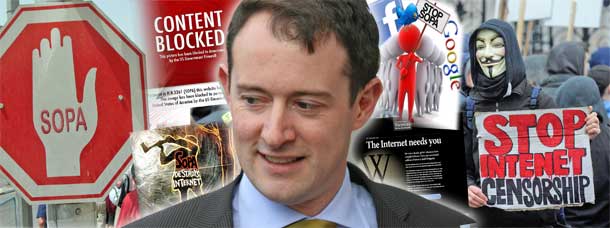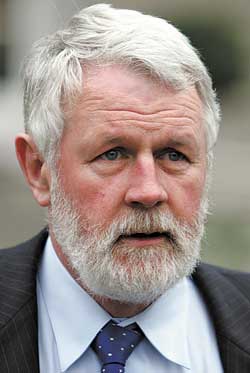30 April 2012 Edition
Web access jeopardised by proposed new law
BACKLASH FORCES MINISTER TO EXTEND PUBLIC CONSULTATION DEADLINE TO THURSDAY 31 MAY

Minister Seán Sherlock has faced a storm of controversy over his introduction of new copyright legislation
‘With one injunction based on one bad link from one person, all of Ireland could lose access to a news site, social network, video sharing or any other kind of site’
THE Fine Gael/Labour Party Government’s Innovation Minister, Seán Sherlock, wants to to push into law by a ministerial order — without a vote by TDs — controversial and far-reaching legislation that could affect everyone’s access to YouTube, Facebook, Twitter and countless websites and blogs.
Under this law, global music and movie giants could sue and get the courts to shut down sites accused of hosting downloads of copywrighted material, either intentionally or unintentionally.
The legislation here is called the European Union (Copyright and Related Rights) Regulations 2012. A similar law in the United States brought a nationwide reaction from angry Internet users and seven million Americans contacted their politicians to oppose the Stop Online Piracy Act (SOPA).
Now a campaign group in Ireland is trying to prevent a government and corporate clampdown on information and access to the web. So far, more than 80,000 people here have signed the online petition by ‘Stop SOPA Ireland’ at stopsopaireland.com.
Stop SOPA Ireland says that if Minister Seán Sherlock pushes through the new law then YouTube, Twitter, Facebook and other popular sites may be blocked in Ireland. “These sites depend on user-created content,” SOPA says. “With one injunction based on one bad link from one person, all of Ireland could lose access to a news site, social network, video sharing or any other kind of site.”
The new law mandates a no-warning process, no mediation and no appeals process outside the High Court. Smaller sites — including individual blogs, podcasts and independent news sources who don’t have the money to mount the costly legal campaign needed to defend themselves — “will automatically lose out to corporate interests with deep pockets”.

Sinn Féin TD Martin Ferris said during a Dáil debate in January that “the absence of democratic scrutiny on this measure has been highlighted by its critics already”. He went on to say that the changes to the copyright legislation give “too much interpretative power to the courts”. The Sinn Féin deputy added:
“While intellectual property rights need to be protected, measures framed at the behest of or to reflect court decisions in favour of large music companies, for example, are not the correct way to proceed.”
During a public debate at the Science Gallery in Dublin in April, Paul Durrant of the Internet Service Providers Association of Ireland raised concerns that the Innovation Minister’s legislation would stifle growth in the area of cloud computing as it is based on delivering software, infrastructure and storage over the Internet. This contrasts sharply with Taoiseach Enda Kenny’s claim that Ireland could become “the cloud computing capital of the world”, he said.
Tom Murphy, director and founder of Boards.ie (the Irish bulletin board site offering web hosting, chat rooms and news group access), said the legislation amounts to censorship because Internet Service Providers would be intimidated by the possible (and unquantifiable) legal consequences of what others might do. Pointing to every individual in the audience, he said: “If what you say could land me in court tomorrow, there is no way in hell I’m going to let you say it. That is the basis of this problem.” Murphy described the legislation as “akin to National Irish Bank taking proceedings against a toll road because a getaway driver used the road after a bank robbery — but it’s not the toll road’s fault it was used for an illegal purpose”.
Speaking also at the debate, Minister Seán Sherlock rejected claims that the new law was comparable to the SOPA in the United States. He said they had to try and protect the rights of copyright holders and intermediaries. He is now engaging in a consultation process and has extended the deadline for submissions to the Copyright Review Commission to Thursday 31 May. A hostile reaction from the crowd over his decision to sign the order before the consultation process and his admission that he did not show the Attorney General an alternatively-worded Statutory Instrument (ministerial order) produced by the Dáil Opposition led Sherlock to say it is clear that “people are well pissed off with us as a government”.
- Members of the public can examine the current copyright legislation on the Department of Jobs, Enterprise and Innovation website (www.djei.ie) and offer their submissions until the deadline.




